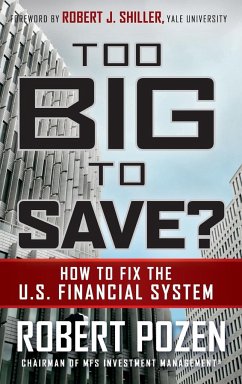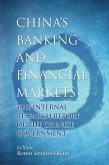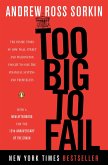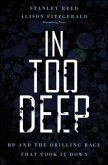Industry luminary Robert Pozen offers his insights on the future of U.S. finance
The recent credit crisis and the resulting bailout program are unprecedented events in the financial industry. While it's important to understand what got us here, it's even more important to consider how we should get out. While there is little question that immediate action was required to stabilize the situation, it is now time to look for a long-term plan to reform the United States financial industry.
That is where Bob Pozen comes in. Perhaps more than anyone in the industry, Pozen commands the respect and attention of the public and private sector. In this timely guide, he outlines his vision for the new financial future and provides actionable advice along the way. To Pozen, there are four high-priority problems that must be addressed, and this book puts them in perspective
Analyzes alternative models for government stakes in banks
Recommends a new board structure for large financial institutions
Examines the importance of broader Fed jurisdiction over systemic risks
Proposes a way to revive the securitization of loans
With Too Big to Save, you'll learn the likely future of the finance industry and understand why changes have to be made.
Hinweis: Dieser Artikel kann nur an eine deutsche Lieferadresse ausgeliefert werden.
The recent credit crisis and the resulting bailout program are unprecedented events in the financial industry. While it's important to understand what got us here, it's even more important to consider how we should get out. While there is little question that immediate action was required to stabilize the situation, it is now time to look for a long-term plan to reform the United States financial industry.
That is where Bob Pozen comes in. Perhaps more than anyone in the industry, Pozen commands the respect and attention of the public and private sector. In this timely guide, he outlines his vision for the new financial future and provides actionable advice along the way. To Pozen, there are four high-priority problems that must be addressed, and this book puts them in perspective
Analyzes alternative models for government stakes in banks
Recommends a new board structure for large financial institutions
Examines the importance of broader Fed jurisdiction over systemic risks
Proposes a way to revive the securitization of loans
With Too Big to Save, you'll learn the likely future of the finance industry and understand why changes have to be made.
Hinweis: Dieser Artikel kann nur an eine deutsche Lieferadresse ausgeliefert werden.
"For the last two years I've been receiving requests -- email and otherwise -- for a readable, educating book on the financial crisis. And while various books on the crisis have had their merits, no one of them has fit that bill. Until now. Robert Pozen's Too Big to Save? How to Fix the U.S. Financial System is the single best source for figuring out what happened. It is the go-to book if you are a non-specialist and want to understand: how credit default swaps work, the significance of Basel II, mark-to-market, how the various Fed bailouts operated, the meaning of the toxic asset plans, and many other matters."
--Tyler Cowen/ September 2009, http://www.marginalrevolution.com
"Should be required reading on Capitol Hill."
--Kevin Hall, McClatchy Newspapers
"Pozen's book offers significantly more than a factual recitation of events leading up to and during the credit crisis. Beyond that, it offers a comprehensive framework for analysis and concrete proposals for appropriate regulatory responses. Broadly, Pozen's aim is not - or not only - to tell the story of the crisis, but rather to analyze how the crisis can illuminate and inform the appropriate relationship between government and financial markets. Pozen describes specific regulatory innovations intended to keep pace with the speed and complexity of financial innovation. He offers, that is, the analysis sorely lacking in more journalistic accounts of the crisis. In that regard, his book is one of the few in the growing literature arising out of the crisis that should inform any serious discussion of new financial regulation."
--Alisa Greenstein, The Hedge Fund Law Report, October 2009
"Pozen seems to be right (or at least in broad agreement with me) the overwhelming majority of the time. And as you can also see, he makes a lot of recommendations, on everything from accounting standards to insurance regulation. Tyler Cowen is quite right to give the book a rave review."
--Felix Salmon, blogs.reuters.com/felix-salmon, November 2009
"This is a book for investors who want to understand the details of our financial landscape, and who also want to consider arguments on restricting mortgage-lending practices, whether financial derivatives and hedge funds should be regulated or the revival of loan securitization, among others." (SmartMoney, November 2009)
"There has not been a more timely and important book written this decade. ... In summary, Too Big to Save is comprehensive, rigorous, and descriptive as well as prescriptive. The US economy is too important a global player to be ignored, and Pozen's analysis in 'Too Big Too Save' is too important to not be read. This book is truly a gem and a strongly recommended read."
--Sean Cameron, The Harvard Law School Forum on Corporate Governance and Financial Regulation ( http://blogs.law.harvard.edu/corpgov , November 2009
"The best finance book I've read so far this year (and I've read a slew of them) is Robert C. Pozen's Too Big to Save? How to Fix the U.S. Financial System. ... I can't think of anybody who has covered such a range of issues so efficiently or so well." (Brad DeLong, ( http://delong.typepad.com, November 2009
"TOO BIG TO SAVE? asks and answers the questions weighing on every American's mind...a highly readable and well-paced narrative...a valuable guide to a wide audience of readers, from American voters who felt disenfranchised by the events of September 2008 and are looking for an accessible resource to further inform their perspective, to professionals who seek a single source for an engaging account of the crisis and its implications for businesses today and tomorrow."
--Elizabeth Leonard, Forbes.com, December 2009
"University economists are already teaching courses on the history of the financial crisis of 2008 and the policy responses that followed. Robert Pozen's new book could become required reading."
--Ross Kerber, Reuters, December 2009
"To command the weary reviewer's attention, any new book on the aberrations of the financial community has to have a clear focus and make a compelling case. In Too Big To Save? Robert Pozen, chairman of mutual fund group MFS Investment Management and a former vice-chairman of Fidelity Investments, pulls off the trick. ... The story of excessive risk-taking and leverage is lucidly told and accessible to the layman, with good explanations of securitisation, toxic structured products and the global dimension of the crisis. The policy recommendations are thoughtful and mostly full of good sense."
-- John Plender, Financial Times, February 2010
"The first thing one can see from the book is how much of a genius Robert Pozen is. He has a clear grasp on many complex issues facing the US and world economy. Too Big to Save? is probably the best book about financial reform written so far."
--Jacob Wolinksy, GuruFocus.com, February 2010
"... thorough, intelligent and straightforward ..."
--Jim McTague, Barron's, March 2010
"While there are many books on the financial crisis, too many of them say too much about what went wrong and not enough about how to fix the problem. Bob Pozen's book Too Big to Save? (Wiley, 2009) breaks the mold. It not only analyzes the causes of the crisis with uncommon clarity, but also supplies a compelling road map for reform."
--Stephen J. Hadley, Harvard Business Review, March 2010
"If you're only going to read one book on the financial crisis, this should be the one."
-- Matthew Rees, The American, May 2010
--Tyler Cowen/ September 2009, http://www.marginalrevolution.com
"Should be required reading on Capitol Hill."
--Kevin Hall, McClatchy Newspapers
"Pozen's book offers significantly more than a factual recitation of events leading up to and during the credit crisis. Beyond that, it offers a comprehensive framework for analysis and concrete proposals for appropriate regulatory responses. Broadly, Pozen's aim is not - or not only - to tell the story of the crisis, but rather to analyze how the crisis can illuminate and inform the appropriate relationship between government and financial markets. Pozen describes specific regulatory innovations intended to keep pace with the speed and complexity of financial innovation. He offers, that is, the analysis sorely lacking in more journalistic accounts of the crisis. In that regard, his book is one of the few in the growing literature arising out of the crisis that should inform any serious discussion of new financial regulation."
--Alisa Greenstein, The Hedge Fund Law Report, October 2009
"Pozen seems to be right (or at least in broad agreement with me) the overwhelming majority of the time. And as you can also see, he makes a lot of recommendations, on everything from accounting standards to insurance regulation. Tyler Cowen is quite right to give the book a rave review."
--Felix Salmon, blogs.reuters.com/felix-salmon, November 2009
"This is a book for investors who want to understand the details of our financial landscape, and who also want to consider arguments on restricting mortgage-lending practices, whether financial derivatives and hedge funds should be regulated or the revival of loan securitization, among others." (SmartMoney, November 2009)
"There has not been a more timely and important book written this decade. ... In summary, Too Big to Save is comprehensive, rigorous, and descriptive as well as prescriptive. The US economy is too important a global player to be ignored, and Pozen's analysis in 'Too Big Too Save' is too important to not be read. This book is truly a gem and a strongly recommended read."
--Sean Cameron, The Harvard Law School Forum on Corporate Governance and Financial Regulation ( http://blogs.law.harvard.edu/corpgov , November 2009
"The best finance book I've read so far this year (and I've read a slew of them) is Robert C. Pozen's Too Big to Save? How to Fix the U.S. Financial System. ... I can't think of anybody who has covered such a range of issues so efficiently or so well." (Brad DeLong, ( http://delong.typepad.com, November 2009
"TOO BIG TO SAVE? asks and answers the questions weighing on every American's mind...a highly readable and well-paced narrative...a valuable guide to a wide audience of readers, from American voters who felt disenfranchised by the events of September 2008 and are looking for an accessible resource to further inform their perspective, to professionals who seek a single source for an engaging account of the crisis and its implications for businesses today and tomorrow."
--Elizabeth Leonard, Forbes.com, December 2009
"University economists are already teaching courses on the history of the financial crisis of 2008 and the policy responses that followed. Robert Pozen's new book could become required reading."
--Ross Kerber, Reuters, December 2009
"To command the weary reviewer's attention, any new book on the aberrations of the financial community has to have a clear focus and make a compelling case. In Too Big To Save? Robert Pozen, chairman of mutual fund group MFS Investment Management and a former vice-chairman of Fidelity Investments, pulls off the trick. ... The story of excessive risk-taking and leverage is lucidly told and accessible to the layman, with good explanations of securitisation, toxic structured products and the global dimension of the crisis. The policy recommendations are thoughtful and mostly full of good sense."
-- John Plender, Financial Times, February 2010
"The first thing one can see from the book is how much of a genius Robert Pozen is. He has a clear grasp on many complex issues facing the US and world economy. Too Big to Save? is probably the best book about financial reform written so far."
--Jacob Wolinksy, GuruFocus.com, February 2010
"... thorough, intelligent and straightforward ..."
--Jim McTague, Barron's, March 2010
"While there are many books on the financial crisis, too many of them say too much about what went wrong and not enough about how to fix the problem. Bob Pozen's book Too Big to Save? (Wiley, 2009) breaks the mold. It not only analyzes the causes of the crisis with uncommon clarity, but also supplies a compelling road map for reform."
--Stephen J. Hadley, Harvard Business Review, March 2010
"If you're only going to read one book on the financial crisis, this should be the one."
-- Matthew Rees, The American, May 2010







